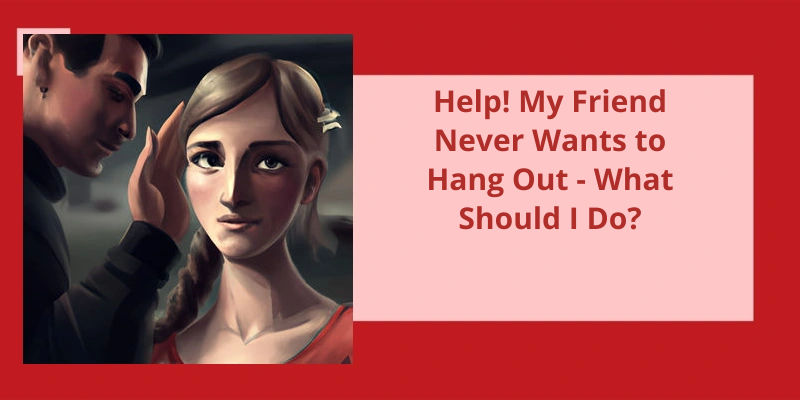Having friends means having a support system, someone to confide in, and someone to share in our experiences with. However, there are times when one friend may start to pull away or seemingly lose interest in spending time together. It can be confusing and even hurtful when a friend never wants to hang out, leaving us wondering what went wrong. Is it something we did? Are they going through something personally? Whatever the reason may be, it can be difficult to navigate the emotions that come with feeling like we're losing a close friend.
How Often Do Normal People Hang Out With Friends?
For many people, hanging out with friends is an essential part of life. This leisure activity helps individuals to unwind and have a good time after a hectic week. The frequency at which individuals hang out with friends, however, differs from person to person. Some people are more sociable and outgoing, and they love to be around people. On the other hand, some individuals prefer to spend a considerable amount of time alone.
The age of an individual can play a significant role in determining how often an individual hangs out with friends. For instance, young adults who live in college dorms and apartments often hang out with friends every day. This is because they’ve a lot of free time, and they love to interact with others. On the other hand, working adults may find it challenging to meet with friends frequently due to their busy schedules.
Individuals who live far away from their friends may find it difficult to meet as often as they’d like. In this case, technology has made it easier for people to stay in touch with friends despite the distance. Social media, messaging apps, and video calls have become popular methods for friends to connect with each other regularly.
The strength of a persons friendship also factors into how often they hang out. Individuals who’re very close to their friends tend to make more of an effort to see them regularly. They might meet with their friends several times a week or make sure to schedule regular activities together. Those who’ve a more casual relationship with their friends may not see them as often.
The Importance of Setting Boundaries in Friend Hangouts for Individual Self-Care.
- Identify your personal limits and communicate them openly with your friends.
- Explain to your friends why setting boundaries is important for your well-being.
- Don’t feel guilty for saying “no” if you need time alone or if an activity doesn’t align with your values.
- Encourage your friends to also set their own boundaries and respect them.
- Be willing to compromise and find a balance that works for everyone.
- Remember that taking care of yourself isn’t selfish, but rather necessary.
Learning how to politely decline an invitation to hang out can be a useful tool in maintaining healthy relationships. While it may be tempting to give a straight answer, using kind and thoughtful language can help avoid hurt feelings and preserve friendships. In this article, we will explore some effective ways to say no to hanging out without causing offense.
What Do You Say When You Don T Want to Hang Out With Someone?
It can be challenging to tell someone you don’t want to hang out, especially if it’s someone you care about or someone youve spent time with before. However, it’s important to be honest with your feelings and communicate them clearly. Avoiding the situation or making up excuses can lead to misunderstandings and hurt feelings.
One approach is to try and frame the situation in a positive light. Instead of simply saying “no,” offer another suggestion, such as “I cant hang out today, but maybe we can try to plan something for next week?”. This conveys that youre interested in spending time together, but it’s just not possible right now.
If youre feeling overwhelmed or stressed, it’s okay to be upfront about it. Saying something like “Im feeling really swamped with work right now, and I don’t think I can give our hangout the attention it deserves” can help the other person understand that your decision isn’t about them.
Another option is to redirect the conversation to a topic you’re comfortable with. You can say something like, “I appreciate the offer, but Im not really in the mood to hang out right now. Have you seen any good movies lately? I could use some recommendations.”. This lets the other person know youre not interested in hanging out without hurting their feelings.
If youre truly not interested in spending time with someone, it’s important to be honest about that, too. However, it’s important to phrase the response in a way that doesn’t come off as rude or dismissive. You could say something like, “I appreciate the invitation, but I don’t think we’ve much in common. Maybe we can catch up in the future if things change.”
Ultimately, the key is to be honest while also being respectful of the other persons feelings. By approaching the situation with kindness and consideration, you can avoid potential conflict and maintain positive relationships.
Coping Strategies for Introverts Who Need Alone Time.
This topic aims to discuss ways introverts can cope when they need time alone. We will explore various techniques that introverts can use to recharge their batteries and maintain their mental health. The suggestions provided will be practical and actionable, helping introverts to navigate their social lives without becoming overwhelmed.
Is It Bad to Not Want to Hang Out With Someone?
Sometimes people simply don’t click. It’s not necessarily about one person being good or bad, it’s just that personalities and interests don’t always mesh well. The important thing is to be honest and courteous about it. It’s better to decline an invitation than to accept and then fail to show up or make excuses for leaving early.
Furthermore, if you feel like you need time alone or simply don’t want to socialize, thats perfectly normal. It’s important to prioritize your mental health and if that means taking a step back from social situations, thats okay. Just make sure to communicate your needs clearly and respectfully.
On the other hand, if you consistently find yourself declining invitations from the same person or group, it might be worth examining why. Are there deeper issues at play? Do you need to have a frank discussion with the other person? Understanding the root cause of your reluctance to hang out can help you address it more effectively.
Ultimately, it’s important to remember that you’ve agency over your time and energy. You don’t owe anyone your presence or attention if it doesn’t feel right for you. Focus on building relationships with people who make you feel fulfilled and happy, and don’t worry about those who don’t quite fit the bill. It’s okay to be selective about who you spend your time with.
In summary, theres nothing wrong with not wanting to hang out with someone, as long as you communicate your decision respectfully. Prioritize your mental health and well-being, and don’t feel guilty for prioritizing your needs. It’s natural to have different connections with different people, and it’s okay to be discerning about who you spend your time with. Overall, be honest, thoughtful, and considerate in your social interactions, and youll build stronger, more fulfilling relationships.
Tips on How to Communicate Your Need for Alone Time to Friends and Family.
- Be honest and direct about your need for alone time.
- Explain the benefits of alone time for your mental health and well-being.
- Suggest alternative ways to spend time together that respect your need for alone time.
- Set clear boundaries around your alone time, such as designated hours or days.
- Reassure your loved ones that your need for alone time doesn’t mean you don’t care about them.
- Thank them for understanding and respecting your need for alone time.
Source: Am I a bad friend for not wanting to hang out with people irl?
Conclusion
In conclusion, it can be challenging when a close friend doesn't seem to want to hang out with you. It's important to realize that people's lives change, and perhaps your friend is dealing with personal issues that you’re unaware of. It's also possible that your friend simply doesn't enjoy the same activities or interests as you do. However, it's important to communicate openly and honestly with your friend about how you feel and try to find common ground. If your efforts are unsuccessful, it may be time to accept that people grow apart and focus on building new connections with others who share your interests and values. Remember, friendships should be a source of joy and support, not stress and disappointment.






